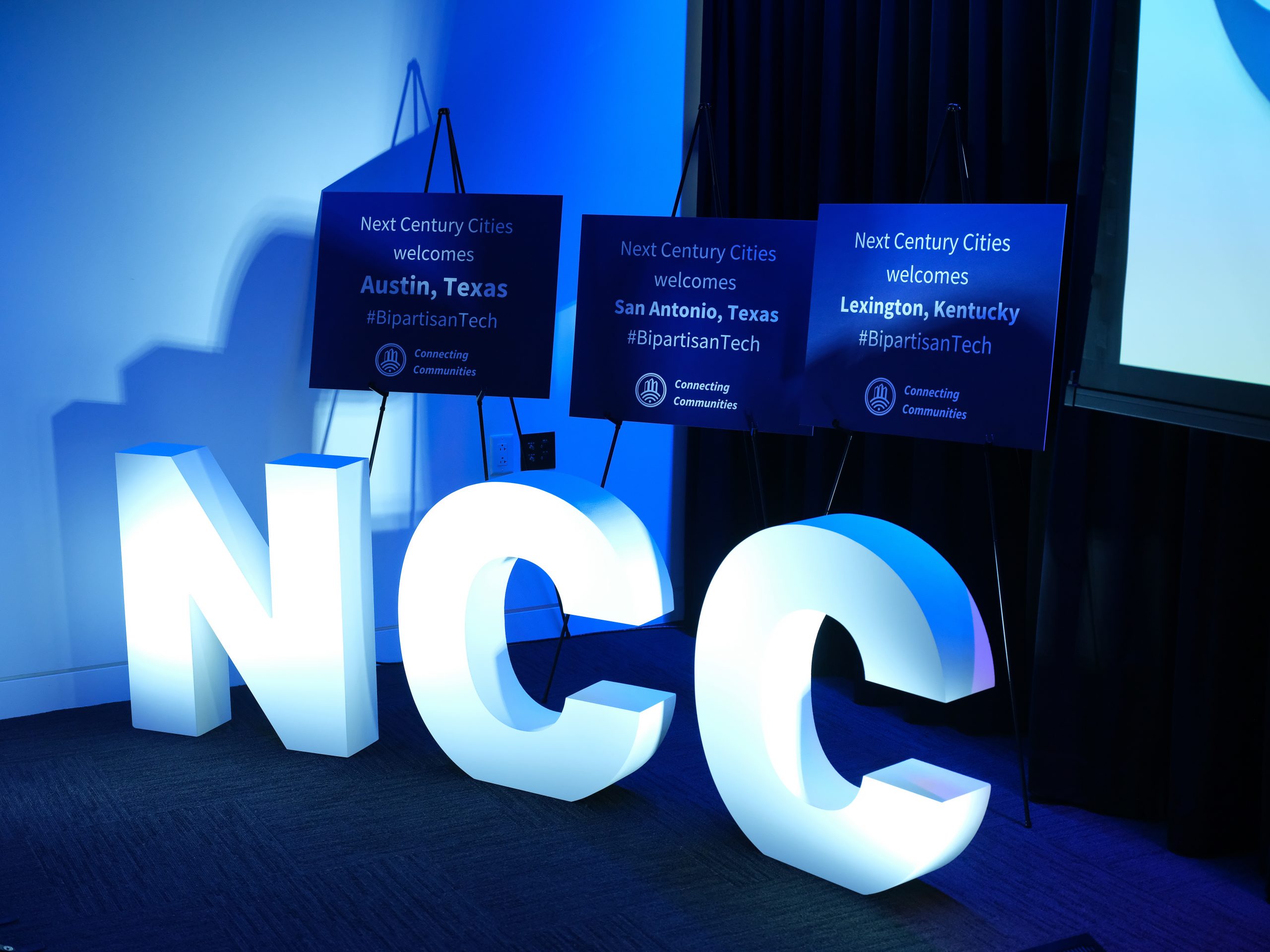By Stacey Baxter


Pictured (Right): Drew Garner, Kenya Asli, Khotan Harmon, Kathryn de Wit, Ryan Collins, and Mike Lynch pictured in front of the US Capitol building. Photo credit: Jessica Burchins.
Congressional briefings are used to communicate information to policymakers in Washington, DC. Oftentimes, they highlight stakeholder views on government programs and proposals. However, they rarely include local officials who can provide community-based insights.
On July 19, 2023, Next Century Cities invited broadband leaders from Texas, Ohio, Maryland, and Massachusetts to Washington, DC. Speakers shared community impact stories and administrative needs for the Affordable Connectivity Program (ACP). The ACP offsets broadband subscription costs for low-income households, discounting services up to $30 per month toward high-speed Internet service for Pell Grant, SNAP, Medicaid, SSI, and Federal Housing Assistance recipients, as well as those living within 200% of the federal poverty line. Residents living on Tribal lands may see benefits up to $75 per month.
Thanks to the National Lifeline Association, NCC hosted the Congressional briefing at the offices of Nelson Mullins. Briefing attendees ranged from included congressional staffers to community advocates, municipal officials – with FCC, NTIA, NASA, and other agency officials among them.
BROADBAND EXPERTS SHARE THEIR INSIGHTS.
Dublin, Ohio’s Chief Innovation Officer Doug McCollough shared an insightful opening keynote. McCollough highlighted the critical importance of “digital wellness,” which includes four vital components:
-
access to broadband Internet;
-
access to devices and knowledge of digital skills;
-
ability to obtain online accounts and services, and
-
making these aspects available in a secure way for individuals.
McCollough explained that building digital wellness starts and ends with trust. Local leaders must build credibility with community members.
Kathryn de Wit, who directs the Pew Charitable Trusts’ broadband internet access initiative, moderated a discussion with Panel broadband experts, including:
-
Kenya Asli from the City of Baltimore,
-
Ryan Collins from the Buckeye Hills Regional Council,
-
Drew Garner from Common Sense Media, and
-
Khotan Harmon from the City of Austin.
Panelists paired local stories with startling statistics that hit home for attendees. Speakers agreed that the ACP significantly improved broadband in their communities. Importantly, panelists highlighted barriers to enrollment and concerns around diminished funding.
KEY TAKEAWAYS
-
The ACP has enabled a new group of people to engage online. Previously unserved populations are now experiencing the benefits of broadband access because of the ACP, whether that be for students doing homework or grandparents connecting with family members.
-
The ACP’s support for community members is unlike any previous broadband program. Khotan Harmon reiterated that the ACP is the only federally funded program focused on broadband internet access. Other programs, like Lifeline, originated for telephone communications and is funded through contributions, not the federal government.
-
The ACP includes a device component, which is a necessity for ensuring that individuals can use their Internet connections. Because the ACP is a voucher program, consumers can move anywhere and still receive the benefit.
-
In the City of Baltimore, tying eligibility to free and reduced school lunch programs allows for entire districts to easily enroll.
-
Families use the extra money saved through vouchers to afford basic necessities such as bus passes or child care.
The ACP is bringing deployment to previously unserved or underserved areas in Ohio, due to the increased customer base for Internet Service Providers (ISPs) with ACP participants.
ACP FUNDING IS EXPECTED TO RUN OUT IN 2024.
Panelists shared a common concern: individuals who are accessing the Internet for the first time could risk losing vital connections, with ACP funding set to expire in mid-2024. In his closing remarks, Mike Lynch, the Legislative Director for the National Association of Telecommunications Officers and Advisors (NATOA), urged policymakers to invest in the ACP, citing how painful it has been to end broadband assistance programs in the past. Along with increased access, the ACP has also created more competition for affordable Internet service. As panelists explained, ISPs want the predictable revenue sources that accompany ACP vouchers. Without secure funding, all of these improvements could vanish.
THE ACP IS WORKING DESPITE ONGOING CHALLENGES.
Trust barriers and the long and cumbersome application process pose challenges to helping eligible households enroll. Still, the ACP is working. As Lynch stated, it’s important to keep it going and working to increase enrollment. Harmon poetically stated, “A city is an idea; people get to decide what it is.” This is true for broadband access as well, and it must start with trust. The keynote speaker and panelists encouraged policymakers to work with existing local organizations, talk to the people who are most impacted, show up in their towns, and listen to their ideas that are grounded in real-world experiences. 
Sincere thanks to our speakers and attendees (in-person and online) who made this event a success. Local insights ensured that this Congressional Briefing was a shared space of learning and focused squarely on broadband expanding access for every American.
Watch the video recap here. Access the program booklet here.
Additional Affordable Internet Resources are available on the National Broadband Resource Hub:
- ACP Outreach Series: Eliminating Language Barriers and Developing Trusted Partnerships in Cuyahoga County, Ohio
- The Consumer Broadband Nutrition Label: What you Need to Know
- Have you heard about what’s happening in Detroit’s Hope Village neighborhood?
- How can advocates advance our understanding of broadband affordability?

